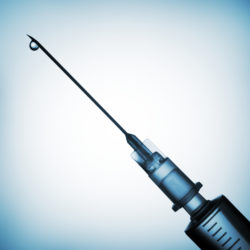Top Class Actions’s website and social media posts use affiliate links. If you make a purchase using such links, we may receive a commission, but it will not result in any additional charges to you. Please review our Affiliate Link Disclosure for more information.

Lovenox is an anticoagulant prescribed to patients who are at risk of developing blood clots, especially those that develop in the legs which is a condition known as deep vein thrombosis (DVT).
On Nov. 16, the plaintiffs in a Lovenox antitrust class action filed a motion for Class certification of two Classes.
The plaintiffs seek to represent a damages Class of indirect buyers in numerous states who paid for or were reimbursed for Lovenox or enoxaparin, the generic version of the drug between Sept. 21, 2011 and Sept. 30, 2015.
States included in the damages Class are Arizona, Arkansas, California, District of Columbia, Florida, Hawaii, Illinois, Iowa, Kansas, Maine, Massachusetts, Michigan, Minnesota, Mississippi, Missouri, Montana, Nebraska, Nevada, New Hampshire, New Mexico, New York, North Carolina, North Dakota, Oregon, South Dakota, Tennessee, Utah, Vermont, West Virginia, and Wisconsin
The plaintiffs also seek to represent a nationwide injunctive relief Class of all indirect purchasers of Lovenox or generic enoxaparin since Sept. 21, 2011.
Nashville General Hospital and American Federation of State, County and Municipal Employees District Council 37 Health & Security Plan, the two plaintiffs in the class action, argue that their allegations center on issues which are common to the Class Members rather than individual and unique.
“These issues — the structure of the enoxaparin market, the nature of the regulatory environment, defendants’ deception and its effects — are all common to the class, and easily predominate over any possible issues affecting only individual members,” the plaintiffs in the Lovenox class action lawsuit argue.
The Lovenox antitrust class action claims that drug manufacturers Momenta Pharmaceuticals Inc. and Sandoz Inc. conspired together to keep another generic version of Lovenox off the market so that the only options for purchasing were Lovenox or generic enoxaparin.
The two companies allegedly entered into an agreement in 2003 in which they agreed to split the profits of Sandoz’s generic enoxaparin. However, this agreement would only take effect if Sandoz’s drug was the only option in the country.
Their tactics for ensuring a monopoly reportedly stemmed from Momenta’s patent on a quality test used in the production of enoxaparin.
According to the Lovenox antitrust class action lawsuit, Momenta managed to manipulate Sanofi-Aventis into throwing out its patent application for a quality test for enoxaparin so that its similar patent would be approved first. The scheme reportedly worked, and Momenta’s patent was approved in 2009.
In 2011, a competing pharmaceutical company received approval by the U.S. Food and Drug Administration (FDA) to sell a generic version of enoxaparin, but Momenta immediately responded by suing the company for patent infringement over their quality test. Through these and similar actions, Momenta has allegedly maintained control of the market and ensured that Sandoz’s generic enoxaparin is the only option.
The proposed Class is represented by Brendan P. Glackin, Mark P. Chalos, Dean M. Harvey, Bruce W. Leppla, Katherine L. Benson, John Tate Spragens and Adam Gitlin of Lieff Cabraser Heimann & Bernstein LLP.
The Lovenox Antitrust Class Action Lawsuit is The Hospital Authority of Metropolitan Government of Nashville and Davidson County Tennessee, et al. v. Momenta Pharmaceuticals Inc., et al., Case No. 3:15-cv-01100, in the U.S. District Court for the Middle District of Tennessee.
UPDATE: December 2019, the Lovenox price-fixing class action website is now live. Click here to learn more.
ATTORNEY ADVERTISING
Top Class Actions is a Proud Member of the American Bar Association
LEGAL INFORMATION IS NOT LEGAL ADVICE
Top Class Actions Legal Statement
©2008 – 2024 Top Class Actions® LLC
Various Trademarks held by their respective owners
This website is not intended for viewing or usage by European Union citizens.















39 thoughts onLovenox Consumers Want Class Certification in Price-Fixing Lawsuit
Please add me, Stephanie Thomas Moles to the Levonox class action as I had to take it during & after my pregnancy in 2012-13, and my son was born with a serious heart defect.
I had Mylar Mesh Hernia Repair, 10 years later the body rejects the foreign object, causing blood clots, knocking the heart into A-fib. I had to take Lovenox. Medical team through omissions & Errors told me clots are from A-Fib.. with no known cause for A-Fib
my wife had 4 stage cancer in 2011 and died in 2012 i had give her the loveonox injections around her bellybutton she passed away what can i do now
Update my address
Please add me took it for one month as stomach injections to prevent clot after surgery in 2015
Please add me.
I was only LOVENOX a few times. Due to pulmonary embolism history. Due to complications from back surgery.
Had a PE twice.
Add me to the lawsuit I took his drug for both knee replacement surgery